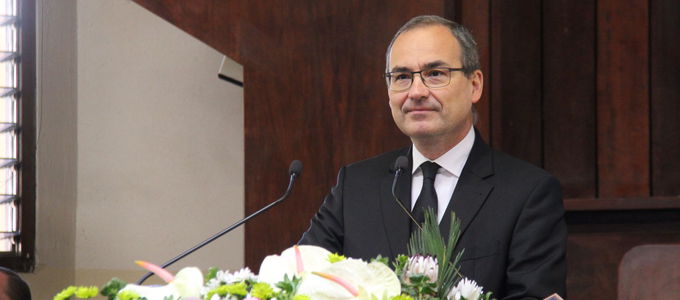
“God help me!”—a call that is often expressed aloud in times of decision. It was concerning times such as these—and what they are good for—that Chief Apostle Jean-Luc Schneider preached in a divine service he conducted in Lusaka, Zambia.
The focus of the sermon on 21 July 2019 was a familiar plea from the Lord’s Prayer: “And do not lead us into temptation, but deliver us from the evil one” (Matthew 6: 13a). “This constitutes the plea that God may lead and help the church,” explained the Church leader. After all, the disciples of the Lord Jesus also witnessed how He would withdraw in silent prayer. And they also noticed that He would always return from each of these prayers with new strength. From this they concluded that the prayers of their Lord were of a special kind, and so they asked Him, “Lord, teach us to pray.” He then prayed the Lord’s Prayer with them.
Temptations lead to decisions
One of the statements in the Lord’s Prayer expresses: “And do not lead us into temptation.” At first, this sounds a little strange, conceded the Chief Apostle. “After all, does God set a trap into which we are supposed to fall?” His answer: “No! Definitely not! God does not want us to fall into sin, but rather that we overcome sin!” Our task is to decide against sin by our own will. This requires a battle—but without a battle, there can be no victory. “We must therefore be tempted in order to gain the victory. We must decide for God and renounce the evil one. That is why we make this statement when we pray.” Behind this is the desire that God may allow us to make a clear decision—namely for Him and against sin. To this end, we request His help, His support, and His strength: “Lord, help us make a good decision, and help us overcome sin.”
When Jesus was in the wilderness …
The Chief Apostle used the majority of his sermon to explain the temptations of the Lord in the wilderness to the congregation. After all, Jesus Himself was also tempted. As true Man, He too had to resist sin. And as a Man, He too had to decide for God when confronted with evil.
The temptation scene in the wilderness incorporated several parts. First came the battle against hunger, said the Chief Apostle. Holy Scripture relates that Jesus did not eat for 40 days and 40 nights. Accordingly, the first temptation was: “If You are the Son of God, command this stone to become bread” (from Luke 4: 3). “Doubts were expressed here about whether He was really the Son of God,” stated the Church leader. He went on to add that we often experience similar things today: difficult times can cause us to call the love of God into question. “At such times, let us ask God to help us to overcome doubt and to trust in Him.”
Salvation has priority
Temptation number two: Jesus was shown all the wealth and all the kingdoms of the world. The evil one was willing to give it all to Him, if only He would fall down and worship him (Luke 4: 6-7). But Jesus declined the offer. “At times we too see the success of the wicked,” said the Chief Apostle. At such times we might likewise be tempted to resort to sin in order to fulfil our needs and wishes. “But we ought rather to ask for God’s help in order to overcome sin.”
“We follow Christ because we want to enter into the kingdom of God. God has priority,” said the Chief Apostle in all clarity. Naturally, human beings can still ask for their daily bread and take care of their natural existence. “But this is not the highest priority in our lives.” After all, “we are not here in order to become rich, but in order to serve the Lord and our neighbour.” And beyond that, “Let us ask God to help us make the right choice. Our priority is the salvation of our souls!”
“At times,” he said, “We forget that we have been elected for a specific task! God has called you in order to serve Him here on earth and in the coming kingdom of peace! We are elected to serve His church and our neighbour.”
His will, not ours, be done
Temptation number three: finally the devil proposed that Jesus should throw Himself from the pinnacle of the temple so that the angels could catch Him up and save Him as stated in Holy Scripture (Luke 4: 9, 11). Once again, Jesus refused to tempt God. He knew that this was not the way to win people for God. He did not want to impose His will upon God’s will by forcing Him to intervene.
“Let us not try to impose our will upon God,” was the caption for this part of the Chief Apostle’s sermon. “Naturally, the Bible tells us that God blesses those who obey Him, and that He hears the prayers of the righteous. But our prayers and our obedience do not oblige God to do what we want!” Instead, let us ask God for the strength to overcome our own will, just as the Lord did: “…Nevertheless, not as I will, but as You will” (Matthew 26: 39).




